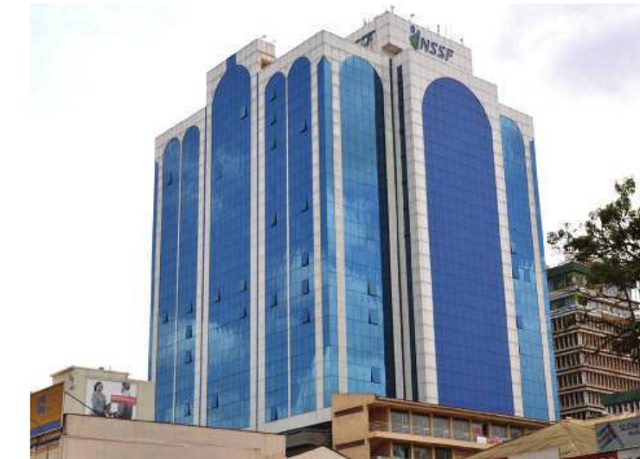
FILE PHOTO: NSSF Headquarters
Kampala, Uganda | THE INDEPENDENT | A cross-section of employees and employers has expressed mixed reactions to proposals by government in the National Social Security Fund Amendment Bill, 2019.
On Tuesday, the Minister of State for Children and Youth Affairs, Florence Nakiwala Kiyingi presented the Bill to parliament for its first reading. The Bill proposes 29 amendments to the NSSF Act 1985.
The Bill among others seeks to make contributions mandatory for all workers in the formal sector so as to expand social security coverage and benefits, to allow workers in the formal and informal sector to make voluntary contributions and also improve management of NSSF.
According to government, the NSSF Act currently needs to be reviewed to streamline NSSF management by establishing a stakeholder board of directors that include representatives of workers, employers and also line ministries-finance and labour.
There is also a proposal to allow midterm access to benefits for members who make voluntary contributions to the Fund.
However, the provisions on taxing benefits withdrawn by members who have not attained 60 years has sparked public debate, with some workers claiming that it will amount to double taxation.
Currently, members who attain 55 years exit the NSSF scheme after a lump sum payment.
54 year old Ismail Eyangu says that he cannot make voluntary contributions because he has been unemployed for a long time.
Johnson Mugisha, who is self-employed opposes mandatory contributions for the formal sector because it will worsen the situation for companies that are already grappling with high costs of doing business including high power tariffs among others.
However, the Secretary General of National Organisation of Trade Unions-NOTU, Peter Werikhe, says that the some individuals have misinterpreted some provisions, particularly those on taxation.
He explains that only new savers will be affected when the Bill is enacted, although they also will have better advantage over current contributors because their contributions will be deducted before any taxes are levied on their incomes and that those who save up until 60 years will get tax-free benefits.
Werikhe, however, proposes an increase of 2 percent for contributions to the NSSF scheme from the current 15 percent to provide for medical insurance. He argues that the 2 percent contribution, shared equally by the employer and employee will enable NSSF to provide medical insurance, as opposed to a National Insurance Health Scheme that government says will require the formal sector employers to contribute 1 percent and employees to contribute 4 percent to the health scheme.
NOTU has 1.2 million members out of the 16 million workers reported as employed in the 2014 National Census. The census report noted that of the employed, 10 million are in the informal sector. Werikhe says that the NSSF Bill aims at ensuring more employees in the informal sector are covered in the scheme.
The Executive Director of Federation of Employers, Douglas Opio, agrees with Werikhe on the tax provision in the Bill. He says that the employees and employers must appreciate that the government had good intentions in the Bill, which are expressed through a deliberate move to expand social security coverage, increasing benefits as opposed to the five benefits for age, invalidity, emigration grant and survivor.
He, however, proposes that NSSF is turned into a pension scheme because its current status as a provident fund means that savers withdraw benefits as a lump sum, and yet they can receive benefits monthly like pensioners for sustainability.
Opio also lauds the government on provision of a board of directors to have the chairperson, managing director, the permanent secretaries for labour and finance ministries, four representatives of employees and two representatives of employers.
However, Opio says that there should be equal representation of employers and employees on the board, as provided in the International Labour Standards Convention, 1976 (No. 144) concerning Tripartite Consultations.
The Federation of Uganda Employers- FUE has 621 members including commercial banks, parastatals such as National Water and Sewerage Corporation among others and 27 sectorial associations who in total employ about 300,000 workers.
The Bill will be scrutinized by the committee on Gender, Labour and Social Development.
*****
URN
 The Independent Uganda: You get the Truth we Pay the Price
The Independent Uganda: You get the Truth we Pay the Price



